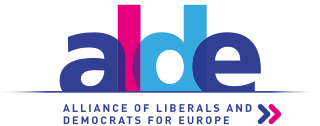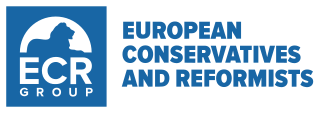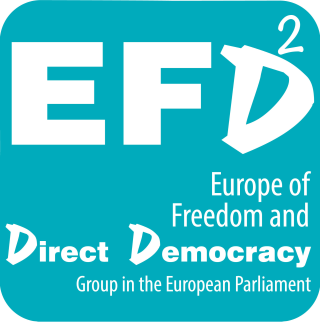Members
| Country | Name | Ideology | ||
|---|---|---|---|---|
| Conservative Party | Conservatives | One-nation conservatism Liberal conservatism | ||
| Conservative People's Party | DKF | Liberal conservatism Social conservatism | ||
| European Conservatives | |
|---|---|
| European Parliament group | |
| Name | European Conservatives |
| English abbr. | C [1] |
| Formal name | European Conservative Group [1] [2] |
| Ideology | Conservatism [3] |
| Political position | Centre-right |
| From | 16 January 1973 [4] |
| To | 17 July 1979 [4] |
| Succeeded by | European Democratic Group |
| Chaired by | Kent S. Kirk, [5] [6] Geoffrey Rippon [6] |
| MEP(s) | 63 (7 July 1979) |
The European Conservative Group was a conservative political group that operated in the European Parliament between 1973 and 1979. At its height in July 1979, it had 63 MEPs.
On 1 January 1973 the Community enlarged for the first time to include Denmark, Republic of Ireland and the United Kingdom. The British Conservative Party and Danish Conservative People's Party formed their own group called the European Conservative Group on 16 January 1973. [1] [4]
In the ensuing years, the group collected additional centre-right members, and on 17 July 1979 [4] it changed its name to the "European Democratic Group". [2] [7]
In March 2009 it was reported that the European Conservatives could be re-created as a group in the European Parliament, led by the British Conservative Party if they withdraw from the European People's Party–European Democrats (EPP-ED) group and succeed in meeting the minimum requirements for a political group in the Parliament. [8] [9]
On 22 June 2009, the British Conservative Party with their colleagues launched the European Conservatives and Reformists (ECR) group. [10]
| Country | Name | Ideology | ||
|---|---|---|---|---|
| Conservative Party | Conservatives | One-nation conservatism Liberal conservatism | ||
| Conservative People's Party | DKF | Liberal conservatism Social conservatism | ||

The European People's Party Group is a political group of the European Parliament consisting of deputies (MEPs) from the member parties of the European People's Party (EPP). Sometimes it also includes independent MEPs and/or deputies from unaffiliated national parties. The EPP Group comprises politicians of Christian democratic, conservative and liberal-conservative orientation.
The European Democratic Group, more commonly known as European Democrats, was a conservative political group that operated in the European Parliament between 1979 and 1992. At its height in July 1979, it had 63 MEPs.

Union for Europe of the Nations (UEN) was a national-conservative, Eurosceptic political group that operated in the European Parliament between 1999 and 2009. At its height in February 2008, it had 44 MEPs. UEN was affiliated with the Alliance for Europe of the Nations political party.

A member of the European Parliament (MEP) is a person who has been elected to serve as a popular representative in the European Parliament.

The 1999 European Parliament election was a European election for all 626 members of the European Parliament held across the 15 European Union member states on 10, 11 and 13 June 1999. The voter turn-out was generally low, except in Belgium and Luxembourg, where voting is compulsory and where national elections were held that same day. This was the first election where Austria, Finland and Sweden voted alongside the other member states, having joined in 1995 and voted separately. The next election was held in 2004.

Venstre, full name Venstre, Danmarks Liberale Parti, is a conservative-liberal, agrarian political party in Denmark. Founded as part of a peasants' movement against the landed aristocracy, today it espouses an economically liberal, pro-free-market ideology.

Independence/Democracy (IND/DEM) was a Eurosceptic political group that operated in the European Parliament between 2004 and 2009. At its height in 2004, it had 37 MEPs and it only existed during the European Parliament's 6th term. It was affiliated with the Eurosceptic Europeans United for Democracy party.

The political groups of the European Parliament are the officially recognised parliamentary groups consisting of legislators of aligned ideologies in the European Parliament.

Hans-Gert Pöttering is a German lawyer, historian and conservative politician, who served as President of the European Parliament from January 2007 to July 2009 and as Chairman of the CDU-affiliated Konrad Adenauer Foundation from 2010 to 2017.

The 2009 European Parliament election was held in the 27 member states of the European Union (EU) between 4 and 7 June 2009. A total of 736 Members of the European Parliament (MEPs) were elected to represent some 500 million Europeans, making these the biggest trans-national elections in history. An additional 18 observers were pre-elected.

Klaus Welle is a German politician who served as Secretary General of the European Parliament between 15 March 2009 to 31 December 2022. He was previously Head of the Office of the President of the European Parliament, Hans-Gert Poettering MEP, from January 2007. He succeeded Harald Rømer, a Danish career civil servant, who had reached retirement age. Welle is also an advisor to the Yale University-based transatlantic think tank, European Horizons.

The 1979 European Parliament election was a series of parliamentary elections held across all 9 European Community member states. They were the first European elections to be held, allowing citizens to elect 410 MEPs to the European Parliament, and also the first international election in history.
The European Democratic Alliance was a heterogeneous political group in the European Parliament between 1984 and 1995. It consisted mainly of deputies from the French Gaullist Rally for the Republic (RPR) and the Irish Fianna Fáil. The grouping had a generally centre-right outlook, and strongly defended the European Union's Common Agricultural Policy.
The Group of European Progressive Democrats was a heterogeneous political group with seats in the European Parliament between 1973 and 1984. It was mostly composed of French Gaullists and Irish Fianna Fáil.

The seventh European Parliament was elected in the 2009 elections and lasted until the 2014 elections.

The Group of the Alliance of Liberals and Democrats for Europe was the liberal–centrist political group of the European Parliament from 2004 until 2019. It was made up of MEPs from two European political parties, the Alliance of Liberals and Democrats for Europe Party and the European Democratic Party, which collectively form the Alliance of Liberals and Democrats for Europe.

Europe of Freedom and Democracy (EFD) was a far-right, Eurosceptic political group that operated in the European Parliament from 2009 to 2014. It was composed of 34 MEPs and it existed during the European Parliament's 7th and 8th terms. After 2011, EFD had a loose relationship with the Movement for a Europe of Liberties and Democracy political party.

The European Conservatives and Reformists Group is a soft Eurosceptic, anti-federalist political group of the European Parliament. The ECR is the parliamentary group of the European Conservatives and Reformists Party European political party, but also includes MEPs from other European parties and MEPs without European party affiliation.

Edward McMillan-Scott is a British politician. He was a pro-EU Member of the European Parliament (MEP) for Yorkshire and the Humber constituency from 1984 until 2014. He was the last and one of the longest-serving UK Vice-Presidents of the European Parliament 2004–2014, holding its Human Rights and Democracy portfolio throughout. After losing his seat as an MEP he became active in campaigning against Brexit and coordinates the largest pro EU forum in the UK.

Europe of Freedom and Direct Democracy was a Eurosceptic and populist political group in the European Parliament. The EFDD group was a continuation for the Eighth European Parliament of the Europe of Freedom and Democracy (EFD) group that existed during the Seventh European Parliament, with significant changes to group membership.